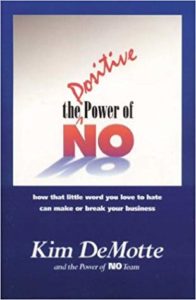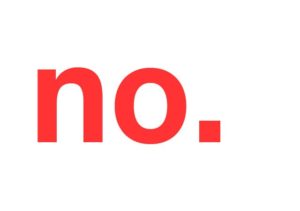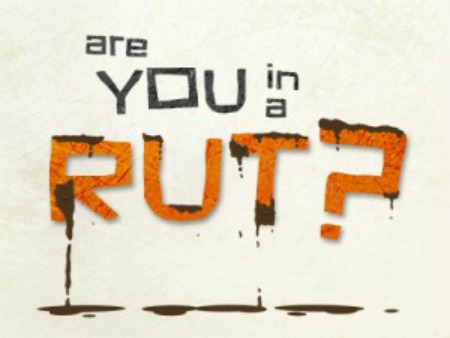 Many years ago I and an intrepid team of business consultants penned the book The Positive Power of NO: How that little word you love to hate can make or break your business.
Many years ago I and an intrepid team of business consultants penned the book The Positive Power of NO: How that little word you love to hate can make or break your business.
It was never a New York Times bestseller, although it did have its fans.
Since that time some 18 years ago, I’ve been awakened to some nuances about the use of the word.
Many of us have a problem with the word NO because we grew up hearing it as the end of our agenda. “Can I have the car tonight?” “NO.”
That use of the word often has no justifiable “why” associated with besides something like “Because I’m the mom.”
We hated it. It ended our fun. It made it clear we were not to go any further, and we didn’t understand why. It was authority ordering us to not do something we wanted to do.
We may have grown up not wanting to use it on others because we knew how much it upset us. And, unfortunately, this usage was commonly heard in our early education, which makes it an integral part of our Knower/Judger “rules of life.” Avoid saying no. It ends things. I call this the “because-I-said-so NO.”
The second usage of NO we learned was the one we started to try somewhere around the age of two or so. (There’s a reason they call them the “terrible twos.”)
My parents told me no all the time and I stopped. Maybe if I tell THEM no, they’ll stop? Maybe. So I tried it. And it felt good. But it didn’t work. Was it the tonality? Maybe if I whined a little bit while trying it? Screamed it? Cried it? Whimpered it? It never seemed to work, but it felt good trying. It sort of kept me in my comfort zone unless my parents got a little too tired of it. If you’ve raised kids, you’ve been through this usage. If you were a kid, you went through it yourself. I call this the “just-because NO.”
Next is the “tough-love NO.” Because the data doesn’t support a yes, it could also be referred to as the “appropriate-response NO.” This is the NO response to the fantasy request based on shaky supposition. It’s intended to stop someone from making an incredibly stupid error because they’ve based their logic on false information. Depending on the receiver’s ability to see new data, this can sound very much like the “Because-I-said-so NO.” It is the responsibility of the naysayer to find a way to help the receiver accept the new data—not always an easy task. But can you see the difference between telling a person NO “because I said so” versus NO “because the data doesn’t support that?” One is very much lodged in the Knower/Judger, and the other in the Learner/Researcher. It’s data driven, not emotion or agenda driven.
Lastly, there’s the “Because-it’s-not-what-I-want NO.”
Surely, coming from a child’s mouth, this may not hold a lot of water in the heat of parental oversight. As we grow older, our parents aren’t the ones deciding what we want; we are. And in order to be fulfilled in life, I believe it’s fair and prudent to set limits on what you will and will not accept (the basic premise of The Positive Power of NO book). This freedom-founded NO can, of course, have consequences, and if one is willing to pay them (e.g., by getting fired or losing a relationship), then one has found the path to taking charge of their own existence.
This no is not founded on K/J rules, but rather that inner-core belief that we are worthy and masters of our own fate.
It’s important, to be sure, that, when using this version, we are not regurgitating some historical rule committed to memory in our past, but that we’re actually in touch with our core beliefs. I believe it takes reasonable self-worth to successfully use this “Because-it’s-not-what-I-want” NO.
Think about the power of this no in less-critical real-life situations. The salesperson trying to sell you siding is trained to overcome every objection you can think of: price, color, shape, material, delivery date, you name it. As long as you avoid using this NO (because you’ve learned that saying no is not socially acceptable), Mr. Salesman will skillfully respond to all of your reasons why you might not buy today. But if you simply say “NO, because that’s not what I want,” he’s done. He can’t object to that. It’s the purest form of NO and the most productive.
So next time you feel like telling someone NO, figure out your motivation.
Is it NO because I said so? (in your face and argumentative)
NO just because? (whiny, but it makes me feel good)
NO because the data doesn’t support the proposition? (tough love, and proposer might want to check their data)
or…
NO because I just don’t want it?



